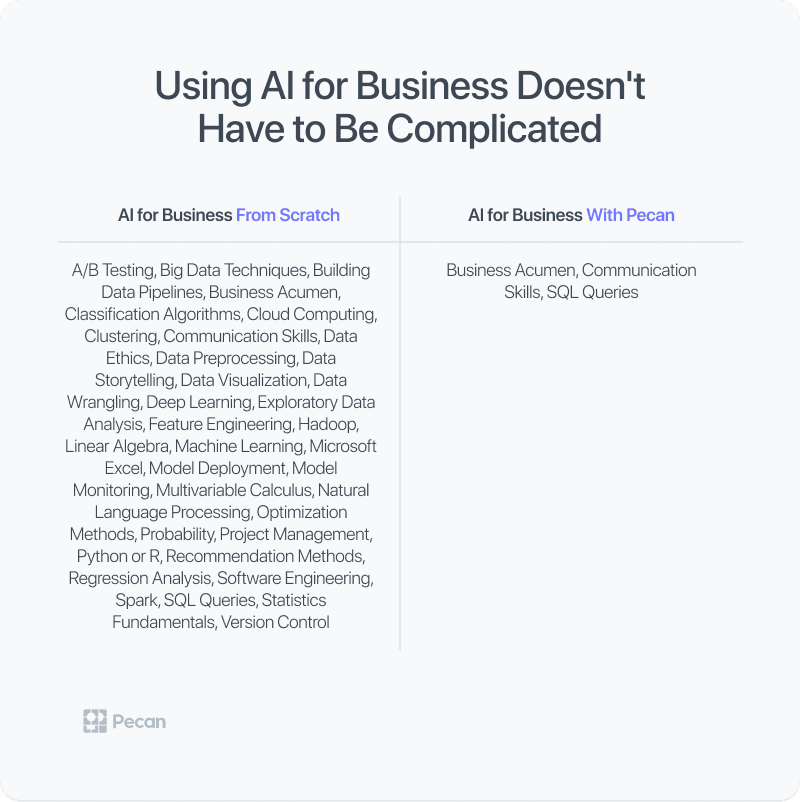In a nutshell:
- Data analysts can now offer predictive capabilities without needing to learn programming languages or advanced statistics.
- Predictive analytics can help businesses gain a competitive edge by predicting customer behavior.
- You don't need Python to use predictive analytics effectively with tools like Pecan.
- Skills needed include business acumen, communication skills, and fluency in SQL queries.
- You can leverage existing skills to provide accurate predictive insights for your company using Pecan.
The “data scientist” job title has a certain mystique. Once named the “sexiest job of the 21st century,” the role has been in high demand for a decade now. Meanwhile, data analysts work alongside their data science counterparts, producing meaningful projects that inform and impact business results. But data scientists’ ability to build predictive models with machine learning has typically set them apart.
Well, here’s the thing: technology has moved forward. In fact, data analysts are now also able to offer their employers predictive capabilities, without spending time training with programming languages and advanced statistics.
It all boils down to the technology you use. With the right tools at your fingertips, you can work closely with business teams in your company and help them unleash the full power of predictive analytics – without going back to school or completing online certifications in data science.
We’re going to share exactly what you need to use predictive analytics and show you that you’ve already got what it takes.
Why Use Predictive Analytics
Predictive analytics may sound futuristic, but it is very much here and now, and businesses should all take advantage of it. Using complex models, predictive analytics can answer pressing business questions and predict customer behavior.
As the economy enters a recession and competition across industries heats up, anything that a company can do to gain a competitive edge is important. This means taking advantage of all that technology has to offer and diving deep into customer behavior. Being able to predict how customers will respond in certain situations means being able to offer personalized deals and incentives, and focusing on higher-value customers in order to maximize revenue.
Why You Don’t Need Python
Data scientists love building models. They like testing out new methods and seeing what new trends and patterns they can uncover. The problem, however, is that their innovative models are not necessarily in sync with a company’s business needs and goals.
We aren’t knocking data scientists, by the way. Pecan’s solution could not have been built without them! The data scientists and AI experts who designed the Pecan platform used state-of-the-art techniques and tested all methods thousands of times — far more than a data scientist would test one-off code written to develop one particular model.
They’ve done all the hard work for you, resulting in a low-code predictive analytics platform ready for you to connect to your data sources. Connections in place, you can start making invaluable predictions about customer behavior and gaining predictive insights.
So What Skills Do You Need?
You do, of course, need some skills to be able to use predictive analytics effectively. But unlike the laundry list that you need to be a full-fledged data scientist, you can achieve the same results with three skills that we’re willing to bet you already have.
-

- Embracing AI may be more possible than you think!
Business Acumen
The expression “garbage in, garbage out” is often used in relation to data projects. If your data contains useless, inaccurate, or duplicate information, the resulting analysis will also be fairly useless. The same holds true for predictive analytics. It’s crucial to understand the business questions and goals before you design a predictive project for the results to be impactful.
Coinmama, a cryptocurrency exchange, uses Pecan to predict customer behavior specifically to reduce chargebacks and fraudulent behavior. Putting this tool in the hands of their in-house data analyst team has given them predictive capabilities without the need to hire a data scientist.
According to Coinmama data analyst Tammy Rotem, “there’s the added value of being in-house builders with Pecan. We know our data best, and we know how to use the platform in the best way to complement our data.”
As a data analyst, you are already in tune with the business needs of your team and organization. You can now take that information and use Pecan’s platform to solve your company’s most pressing challenges.
Communication Skills
Ongoing and clear communication between data analysts and business managers is also key to getting the most out of predictive analytics. You want to have a dialogue about the team or the company’s goals, the KPIs that need to be tracked, and/or any challenges that need to be addressed using predictive analytics.
The better you are at asking the right questions, the more informed you’ll be when you start using Pecan to get the meaningful predictions and predictive insights you need.
Once you have the results from Pecan, you also need to be able to present them clearly to the business stakeholders. The platform itself will help by providing a visual display of the results, so all you need to do is give a verbal explanation that goes along with the graphics.
You’ll be able to communicate the business relevance of the platform’s output and explain how it helps solve the business problem at hand.
SQL Queries
The only technical knowledge you need to use Pecan is fluency in SQL queries. Pecan integrates easily with your existing data sources. Through natural-language chat, Predictive GenAI guides you in defining a predictive question that can be answered with a model based on your raw data.
Auto-generated SQL kickstarts your model, which the Pecan engine then automatically builds. The model uses hidden patterns in your data to generate predictions. With those predictions, you can help business teams take more informed, timely, and impactful actions.
Distinctive Skillset, Bigger Results
You don’t need to go back to school and get a degree in data science in order to provide your company with better results. The skills you already have are more than enough to leverage Pecan’s powerful solution and provide accurate and actionable predictive insights that will propel your company forward.
Ready to give it a shot? Sign up now for a free trial and dive right in, or contact us to set up a demo of Pecan.







